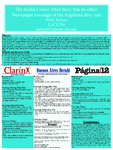The Media's Voice When There Was No Other: Newspaper Coverage of the Argentine Dirty War

View/
Author
Suthers, Holly
Subject
Washington and Lee University -- Poster in Latin American and Caribbean Studies
Investigative reporting
Newspapers
Argentina
Metadata
Show full item recordDescription
Poster; [FULL-TEXT RESTRICTED TO WASHINGTON AND LEE UNIVERSITY LOGIN] Holly Suthers is a member of the Class of 2011 of Washington and Lee University. The period of state sponsored violence, known as the dirty war (guerra sucia), from 1976-1983 marked the disappearances, tortures and ultimately murders of an estimated 18,000 to 30,000 victims in Argentina. Throughout this time period, many voices were silenced and the atrocities committed by the authoritarian regimes in power were unknown to not only the nation, but to the world. The press played a crucial role during the dirty war, immediately after and even today by informing the public, exposing the actions of the state and recording history and memories of the silenced years. The coverage by three of Argentina's newspapers, Clarín, the Buenos Aires Herald and Página 12, have each contributed in a unique way to the creation of a collective memory of the dirty war for the Argentine population. The reporting held the governments responsible for its actions, informed the world of the human rights violations, exposed the confessions of military leaders and gave a voice to victims at a time when there was no other. Most significantly, however, the three newspapers have revealed the truth to the Argentine people, which has led the nation to remember and memorialize the thousands of victims of the dirty war and to respond to the trauma through collective reexperiencing. [From the Thesis section]